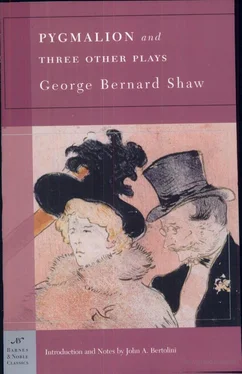THE DUMB CAPABLES AND THE NOISY INCAPABLES
Confronted with this picture of insensate delusion and folly, the critical reader will immediately counter-plead that England all this time was conducting a war which involved the organization of several millions of fighting men and of the workers who were supplying them with provisions, munitions, and transport, and that this could not have been done by a mob of hysterical ranters. This is fortunately true. To pass from the newspaper offices and political platforms and club fenders and suburban drawing-rooms to the Army and the munition factories was to pass from Bedlam to the busiest and sanest of workaday worlds. It was to rediscover England, and find solid ground for the faith of those who still believed in her. But a necessary condition of this efficiency was that those who were efficient should give all their time to their business and leave the rabble raving to its heart’s content. Indeed the raving was useful to the efficient, because, as it was always wide of the mark, it often distracted attention very conveniently from operations that would have been defeated or hindered by publicity. A precept which I endeavored vainly to popularize early in the war, “If you have anything to do go and do it: if not, for heaven’s sake get out of the way,” was only half carried out. Certainly the capable people went and did it; but the incapables would by no means get out of the way: they fussed and bawled and were only prevented from getting very seriously into the way by the blessed fact that they never knew where the way was. Thus whilst all the efficiency of England was silent and invisible, all its imbecility was deafening the heavens with its clamor and blotting out the sun with its dust. It was also unfortunately intimidating the Government by its blusterings into using the irresistible powers of the State to intimidate the sensible people, thus enabling a despicable minority of would-be lynchers to set up a reign of terror which could at any time have been broken by a single stern word from a responsible minister. But our ministers had not that sort of courage: neither Heartbreak House nor Horseback Hall had bred it, much less the suburbs. When matters at last came to the looting of shops by criminals under patriotic pretexts, it was the police force and not the Government that put its foot down. There was even one deplorable moment, during the submarine scare, in which the Government yielded to a childish cry for the maltreatment of naval prisoners of war, and, to our great disgrace, was forced by the enemy to behave itself. And yet behind all this public blundering and misconduct and futile mischief, the effective England was carrying on with the most formidable capacity and activity. The ostensible England was making the empire sick with its incontinences, its ignorances, its ferocities, its panics, and its endless and intolerable blarings of Allied national anthems in season and out. The esoteric England was proceeding irresistibly to the conquest of Europe.
THE PRACTICAL BUSINESS MEN
From the beginning the useless people set up a shriek for “practical business men.” By this they meant men who had become rich by placing their personal interests before those of the country, and measuring the success of every activity by the pecuniary profit it brought to them and to those on whom they depended for their supplies of capital. The pitiable failure of some conspicuous samples from the first batch we tried of these poor devils helped to give the whole public side of the war an air of monstrous and hopeless farce. They proved not only that they were useless for public work, but that in a well-ordered nation they would never have been allowed to control private enterprise.
HOW THE FOOLS SHOUTED THE WISE MEN DOWN
Thus, like a fertile country flooded with mud, England showed no sign of her greatness in the days when she was putting forth all her strength to save herself from the worst consequences of her littleness. Most of the men of action, occupied to the last hour of their time with urgent practical work, had to leave to idler people, or to professional rhetoricians, the presentation of the war to the reason and imagination of the country and the world in speeches, poems, manifestoes, picture posters, and newspaper articles. I have had the privilege of hearing some of our ablest commanders talking about their work; and I have shared the common lot of reading the accounts of that work given to the world by the newspapers. No two experiences could be more different. But in the end the talkers obtained a dangerous ascendancy over the rank and file of the men of action; for though the great men of action are always inveterate talkers and often very clever writers, and therefore cannot have their minds formed for them by others, the average man of action, like the average fighter with the bayonet, can give no account of himself in words even to himself, and is apt to pick up and accept what he reads about himself and other people in the papers, except when the writer is rash enough to commit himself on technical points. It was not uncommon during the war to hear a soldier, or a civilian engaged on war work, describing events within his own experience that reduced to utter absurdity the ravings and maunderings of his daily paper, and yet echo the opinions of that paper like a parrot. Thus, to escape from the prevailing confusion and folly, it was not enough to seek the company of the ordinary man of action: one had to get into contact with the master spirits. This was a privilege which only a handful of people could enjoy. For the unprivileged citizen there was no escape. To him the whole country seemed mad, futile, silly, incompetent, with no hope of victory except the hope that the enemy might be just as mad. Only by very resolute reflection and reasoning could he reassure himself that if there was nothing more solid beneath these appalling appearances the war could not possibly have gone on for a single day without a total breakdown of its organization.
Happy were the fools and the thoughtless men of action in those days. The worst of it was that the fools were very strongly represented in parliament, as fools not only elect fools, but can persuade men of action to elect them too. The election that immediately followed the armistice was perhaps the maddest that has ever taken place. Soldiers who had done voluntary and heroic service in the field were defeated by persons who had apparently never run a risk or spent a farthing that they could avoid, and who even had in the course of the election to apologize publicly for bawling Pacifist or Pro-German at their opponent. Party leaders seek such followers, who can always be depended on to walk tamely into the lobby at the party whip’s orders, provided the leader will make their seats safe for them by the process which was called, in derisive reference to the war rationing system, “giving them the coupon.” Other incidents were so grotesque that I cannot mention them without enabling the reader to identify the parties, which would not be fair, as they were no more to blame than thousands of others who must necessarily be nameless. The general result was patently absurd; and the electorate, disgusted at its own work, instantly recoiled to the opposite extreme, and cast out all the coupon candidates at the earliest bye-elections by equally silly majorities. But the mischief of the general election could not be undone; and the Government had not only to pretend to abuse its European victory as it had promised, but actually to do it by starving the enemies who had thrown down their arms. It had, in short, won the election by pledging itself to be thriftlessly wicked, cruel, and vindictive; and it did not find it as easy to escape from this pledge as it had from nobler ones. The end, as I write, is not yet; but it is clear that this thoughtless savagery will recoil on the heads of the Allies so severely that we shall be forced by the sternest necessity to take up our share of healing the Europe we have wounded almost to death instead of attempting to complete her destruction.
Читать дальше












